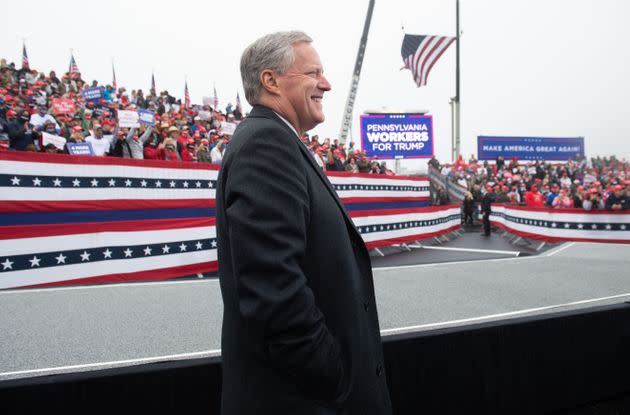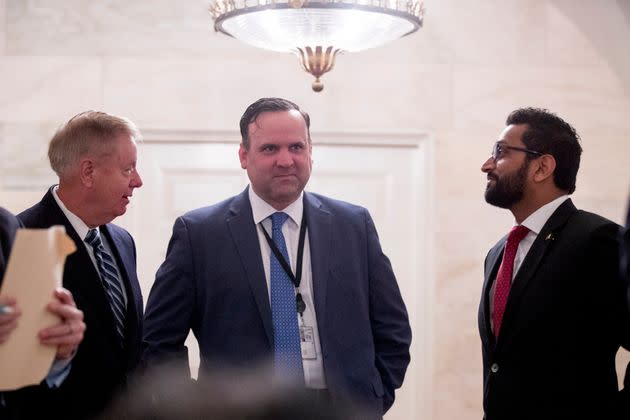Jan. 6 Committee Subpoenas 4 Trump Associates In Capitol Investigation
- Oops!Something went wrong.Please try again later.
- Oops!Something went wrong.Please try again later.
- Oops!Something went wrong.Please try again later.
- Oops!Something went wrong.Please try again later.
- Oops!Something went wrong.Please try again later.
The House Select Committee investigating the Jan. 6 insurrection at the U.S. Capitol has issued subpoenas to four individuals with close ties to former President Donald Trump.
On Thursday, the panel demanded documents and testimony from former White House chief of staff Mark Meadows, former Trump social media chief Dan Scavino, former Defense Department official and House Intelligence Committee aide Kash Patel and former Trump adviser Steve Bannon. These four witnesses were working in the Trump White House or had communications with it on or in the days leading up to Jan. 6.
“The Committee is investigating the facts, circumstances, and causes of the January 6th attack and issues relating to the peaceful transfer of power, to identify and evaluate lessons learned and to recommend corrective laws, policies, procedures, rules, or regulations,” Chairman Bennie Thompson (D-Miss.) wrote in a statement.
The subpoenas instruct Patel and Bannon to appear at an Oct. 14 deposition, and Meadows and Scavino to appear the next day. All four must produce relevant documents by Oct. 7.
The letters Thompson sent to each witness cite both news reports and documents obtained by the committee that suggest these Trump associates have information relevant to the Jan. 6 probe.
In his letter to Meadows, the chairman wrote that the panel “has revealed credible evidence of your involvement in events within the scope” of the investigation and that the former chief of staff has “critical information regarding many elements of our inquiry.”
As chief of staff, Meadows allegedly communicated with officials at the state level and in the Justice Department as part of an effort to overturn the results of the 2020 election or prevent its certification, according to the committee. Meadows also communicated with organizers of the Jan. 6 rally, including Amy Kremer of Women for America First, ProPublica previously reported.
The panel said it had previously sought out White House records relating to Meadows, including his actions, communications and information he received dealing with the election’s results and integrity.

Bannon was the longtime boss of right-wing outlet Breitbart News and helped lead Trump’s 2016 campaign in its home stretch. According to the panel, Bannon communicated with Trump on Dec. 30 to urge him to focus his efforts on Jan. 6. The day before the insurrection, Bannon told listeners of his podcast “War Room” that “all hell is going to break loose tomorrow.”
Patel was a longtime member of House Intelligence Ranking Member Devin Nunes’ staff before Trump chose him to perform several high-profile national security jobs. Patel served as chief of staff to acting then-Defense Secretary Christopher Miller on Nov. 10, the day after Miller replaced Mark Esper in the job.
According to Defense Department documents obtained by the select panel and published accounts, Patel was involved in discussions among senior Pentagon officials before and on Jan. 6 regarding Capitol security — telling a reporter that he was talking with Meadows “nonstop that day.”
Axios reported in January that Trump tried to appoint Patel as deputy director of the CIA in early December, but that effort fell through after then-CIA Director Gina Haspel threatened to resign. Thompson’s letter to Patel cites his being considered for other positions at the end of the Trump administration as reason for him potentially having “knowledge of other planning or activities relevant to the Committee’s inquiry.”

The select committee said it has reason to believe Scavino has knowledge about the communications strategy of Trump and his supporters leading up to Jan. 6. Citing Bob Woodward and Robert Costa’s book “Peril,” the panel said that Scavino was with Trump on Jan. 5 when he and others, incluuding Bannon, were considering how to convince lawmakers not to certify the election for Joe Biden.
Before Trump’s rally on Jan. 6, Scavino promoted it on Twitter by encouraging people to “be a part of history.” Records also indicate that Scavino was tweeting messages from the White House on Jan. 6, according to the committee.
“Your long service with the former President — spanning more than a decade and which included service as his digital strategy director, overseeing his social media presence, including on Twitter — suggest that you have knowledge concerning communications involving the 2020 presidential election and rallies and activities supporting and including the former President on January 6,” Thompson wrote to Scavino.
The subpoenas mark an escalation in the probe by the two-month-old bipartisan committee, though members have already indicated that they expect pushback from these specific witnesses.
Trump released a statement after the panel’s announcement on Thursday, calling it the “Unselect Committee” and repeating his long-debunked claims about the free and fair results of the 2020 election. The former president cited “executive privilege” as a means to block information requests from the committee — a legal theory that has successfully allowed presidents and their aides to avoid or delay congressional scrutiny for decades, especially during the Trump administration.
“It’s not really relevant because there’s no president involved — there’s no such thing as a former president’s executive privilege,” Rep. Jamie Raskin (D-Md.), a committee member and constitutional law professor, told The Washington Post. “That’s extremely dilute and not really relevant.”
Members of the committee are encouraging the current White House to release information with Congress about what Trump and his aides were doing during the Jan. 6 insurrection. According to the Post, President Biden’s White House plans to err on the side of disclosing the information, given the gravity of the events being investigated.
This article originally appeared on HuffPost and has been updated.
